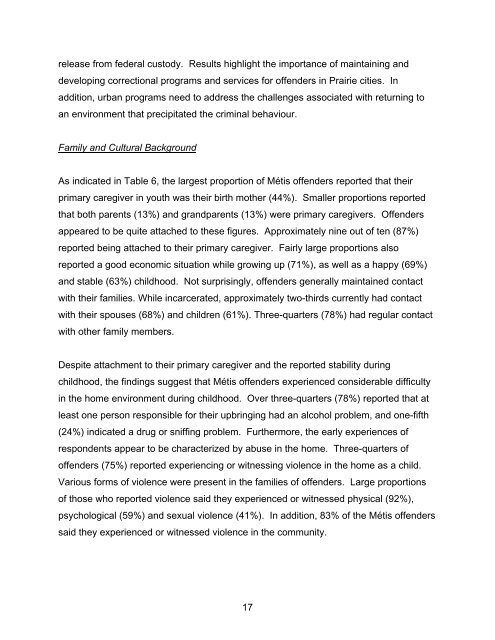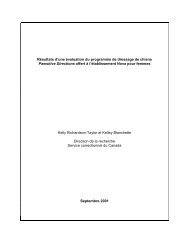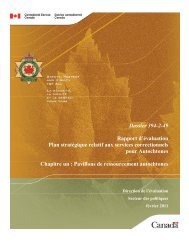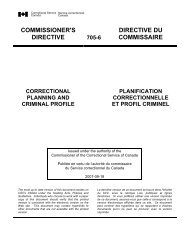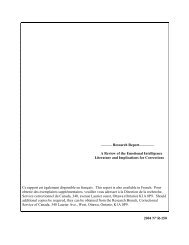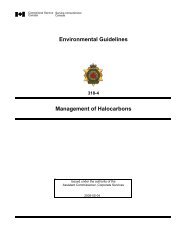Program and Service Needs of Federally Incarcerated Métis ...
Program and Service Needs of Federally Incarcerated Métis ...
Program and Service Needs of Federally Incarcerated Métis ...
You also want an ePaper? Increase the reach of your titles
YUMPU automatically turns print PDFs into web optimized ePapers that Google loves.
elease from federal custody. Results highlight the importance <strong>of</strong> maintaining <strong>and</strong><br />
developing correctional programs <strong>and</strong> services for <strong>of</strong>fenders in Prairie cities. In<br />
addition, urban programs need to address the challenges associated with returning to<br />
an environment that precipitated the criminal behaviour.<br />
Family <strong>and</strong> Cultural Background<br />
As indicated in Table 6, the largest proportion <strong>of</strong> <strong>Métis</strong> <strong>of</strong>fenders reported that their<br />
primary caregiver in youth was their birth mother (44%). Smaller proportions reported<br />
that both parents (13%) <strong>and</strong> gr<strong>and</strong>parents (13%) were primary caregivers. Offenders<br />
appeared to be quite attached to these figures. Approximately nine out <strong>of</strong> ten (87%)<br />
reported being attached to their primary caregiver. Fairly large proportions also<br />
reported a good economic situation while growing up (71%), as well as a happy (69%)<br />
<strong>and</strong> stable (63%) childhood. Not surprisingly, <strong>of</strong>fenders generally maintained contact<br />
with their families. While incarcerated, approximately two-thirds currently had contact<br />
with their spouses (68%) <strong>and</strong> children (61%). Three-quarters (78%) had regular contact<br />
with other family members.<br />
Despite attachment to their primary caregiver <strong>and</strong> the reported stability during<br />
childhood, the findings suggest that <strong>Métis</strong> <strong>of</strong>fenders experienced considerable difficulty<br />
in the home environment during childhood. Over three-quarters (78%) reported that at<br />
least one person responsible for their upbringing had an alcohol problem, <strong>and</strong> one-fifth<br />
(24%) indicated a drug or sniffing problem. Furthermore, the early experiences <strong>of</strong><br />
respondents appear to be characterized by abuse in the home. Three-quarters <strong>of</strong><br />
<strong>of</strong>fenders (75%) reported experiencing or witnessing violence in the home as a child.<br />
Various forms <strong>of</strong> violence were present in the families <strong>of</strong> <strong>of</strong>fenders. Large proportions<br />
<strong>of</strong> those who reported violence said they experienced or witnessed physical (92%),<br />
psychological (59%) <strong>and</strong> sexual violence (41%). In addition, 83% <strong>of</strong> the <strong>Métis</strong> <strong>of</strong>fenders<br />
said they experienced or witnessed violence in the community.<br />
17


